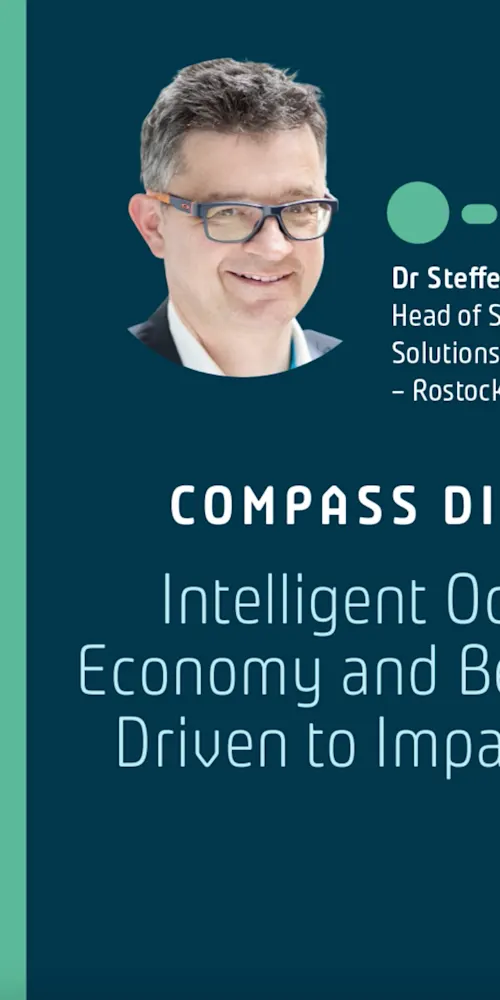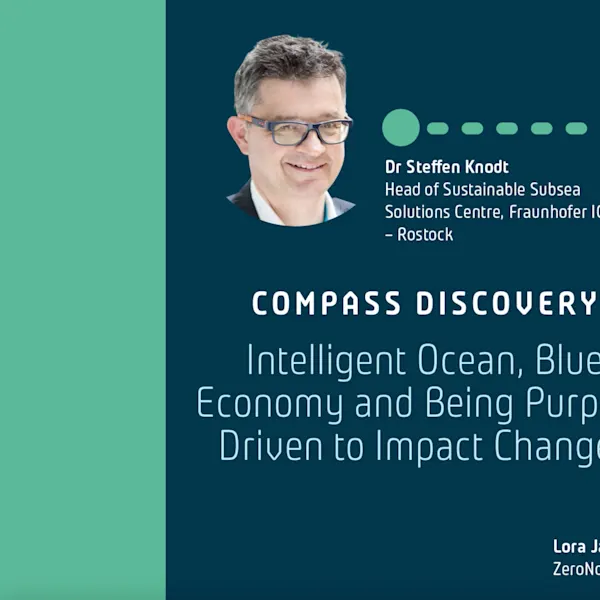How Purpose-Driven Solutions Could Be the Key to Unlocking the Blue Economy
Steffen Knodt, Head of Sustainable Subsea Solutions Centre at Rostock, shares his insights on the development of the ‘Blue Economy’, and how solutions must be married with purpose to truly succeed.

In an industry accelerating towards change and challenges at every turn, and with growing recognition of shipping’s place in a holistic ocean and ‘Blue Economy’, the issue of how to marry business activity with the aims of developing an intelligent sector are becoming more relevant than ever before.
Speaking to ZeroNorth, Steffen Knodt, Head of the Sustainable Subsea Solutions Centre, Rostock, recently shared his thoughts on the Blue Economy and how so-called ‘purpose driven’ solutions have the potential to generate a tremendous impact not only in shipping, but also for our wider ocean and Blue Economies.
Read more about our discussion with Steffen, and the insights he shared in the latest video from our Compass Discovery Series.
Read more: Compass Discoveries: Preparing for Digital Transformation with Ibrahim Gokcen
A more intelligent industry
Currently, we are seeing an increasing number of collaborations and partnerships amongst maritime organisations, not only encouraging information sharing and fostering transparency, but also unifying the industry’s strategy to tackle some of our most significant challenges.
Is this symptomatic of shipping becoming a more ‘intelligent’ industry? Steffen says that there is an important distinction to be found between ‘smart’ sectors, and ‘intelligent’ industries. He argued that connectivity and streamlined operations may result on a more unified and level playing field, but that truly intelligent solutions come from thinking laterally and thinking at pace.
“We are still dependent on projects, we have a lack of practical use cases to test [new solutions], and when it comes to decarbonisation or climate change, we need to be part of these changes,” says Steffen. In short? “We need to be fast.
Lora Jakobsen, ZeroNorth’s Head of Marketing hosted the discussion, and raised the topic of the power of data in small industry. Lora highlighted that individual companies creating their own solutions isn’t enough — instead, a data platform which benefits the whole industry is vital.
Read more: ZeroNorth Launches BunkerAction Bunker Recommendation Software.
“There is a strong force from outside of the industry to work together with maritime players to reduce carbon emissions, get better understanding of the data, and take the next steps.”

Big-picture thinking
More often than not, shipping’s solutions are developed with key target demographics and outcomes in mind. However, this in many respects understandable pursuit for specificity could be hindering not only the shipping industry’s progress, but our wider approach to these global challenges. Steffen encourages dispelling the practice of a ‘one challenge, one objective, one solution’ mindset.
“No company, no industry alone could solve [decarbonisation],” says Steffen. Instead, solutions will likely be created through a mix of industry and non-maritime minds coming together. “There is a strong force from outside of the industry to work together with maritime players to reduce carbon emissions, get better understanding of the data, and take the next steps.
This is precisely the benefit of data-driven solutions, such as ZeroNorth’s Optimise. Actionable data presented to ship operators enables better decision-making and enhanced vessel performance, increased TCE earnings and reduced CO2 emissions. And ZeroNorth’s announced strategic partnerships — with Veson and Spire Maritime — further enables the collection, power and use of data insights for positive and real change.
Read more: Broadening Horizons: ZeroNorth & Spire Maritime Announce a New Data-Led Partnership
According to Steffen the shipping industry is truly “waking up” to the positive impact of digitalisation — and start-ups are playing a significant role in that.
But to truly unlock the solutions needed for the challenges we face, Steffen suggests that the industry could do more to orient itself around ‘purpose driven’ solutions – solutions that can have a symbiotic and beneficial impact to both operations and environment. In doing so, we will turn an increasingly ‘smart’ sector into a truly ‘intelligent’ one and enable shipping to take its central place in the ocean and Blue Economies.
Visit Compass next week for a more in-depth look at Blue Economy and Intelligent Oceans.